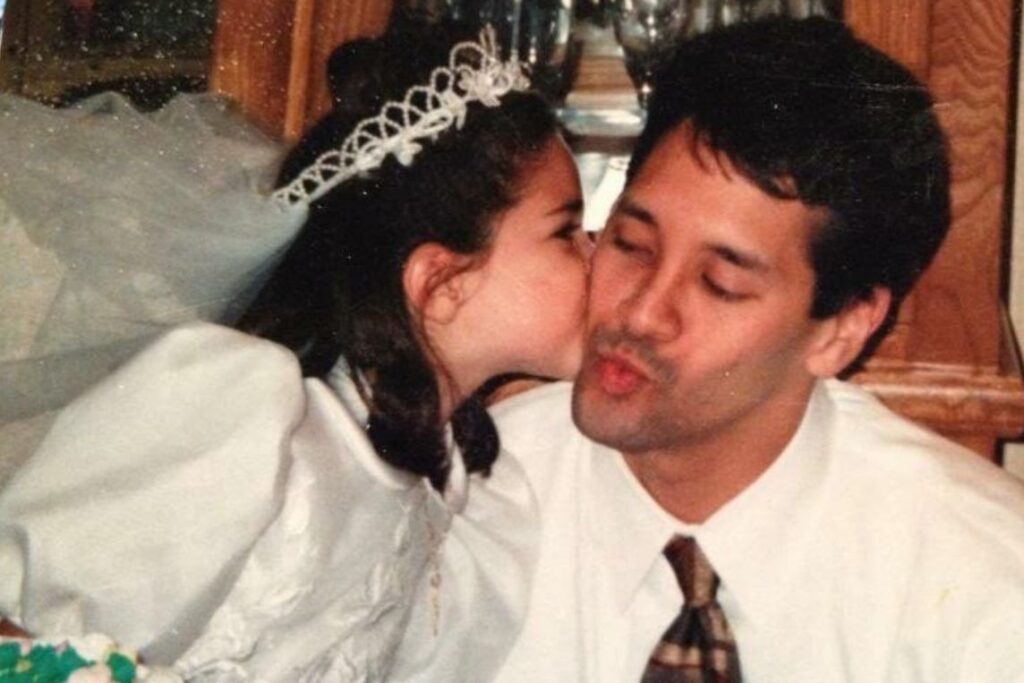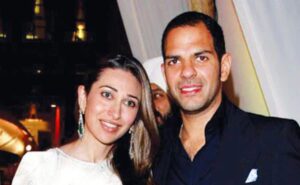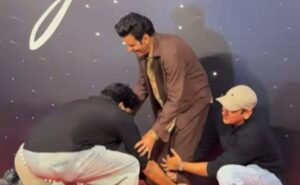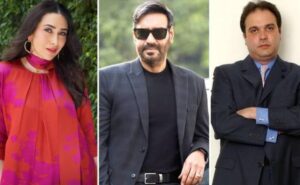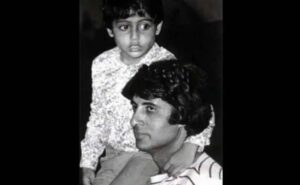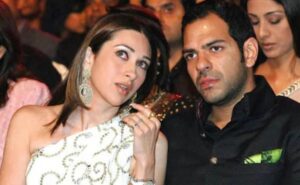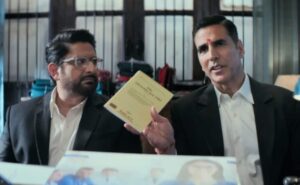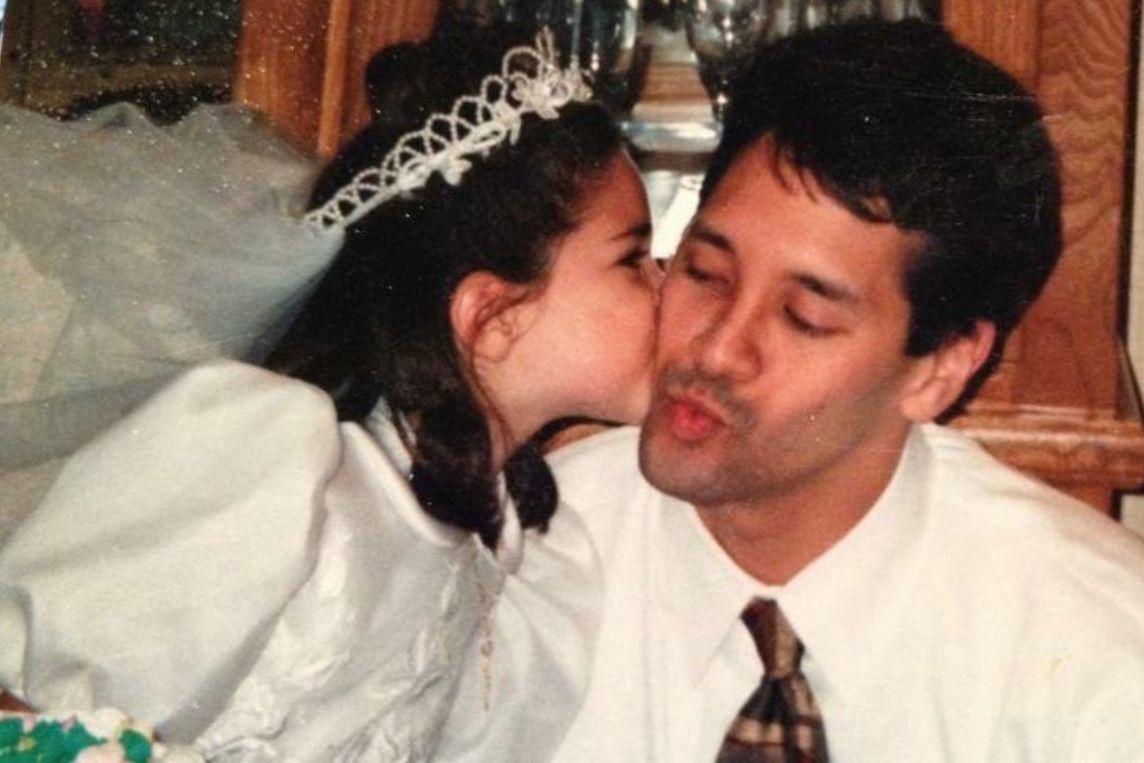
The date — September 11 — will never change. But the way we tell its story already has. It will never get better. Yet as those living and marked by it move through the rest of their lives, the spotlight is shifting. The children whose parents died that day and in its aftermath almost 25 years ago are now parents themselves. They’re building their own communities and working, many as teachers, doctors, finance guys, firefighters, and everything in between. They’re becoming the principal storytellers of the terrorist attacks, and we need to make space for them, be open to their new perspectives and stories of what happened next for them, those we maybe haven’t heard before. Because the way they witnessed it, in the formative vulnerability of childhood, has had lingering, if quietly painful, effects on American society.
I had never talked to anybody about losing a parent that day until I spoke to Olivia Vilardi-Perez. I immediately liked her. She’s funny and smart and good at her job and a mom now. And one of her stories, about her dad, Anthony, stung. It has stayed with me. I think it’s because her loss that day seeped into a space that she, and many of us who were her age then, thought was safe and fun, a place to explore. No matter how hard she tried, she couldn’t get that feeling back.
For many Americans who were young then, whether they were directly affected by it or not, September 11 marked the end of childhood. I explore the formation of their adulthoods in my new book, What Happened to Millennials: In Defense of a Generation.
Nearly a quarter-century after it happened, it is tempting to look back at September 11 and talk about it in big, vague, clichéd terms. The date is often preceded with the phrase “the tragic events of.” It was the “moment everything changed.” It has become every U.S. history teacher’s default essay prompt, asking students to “explain the effects of September 11 on America.”
Those effects were enormous. We are still dealing with them today. Yet grand talk too often deployed can lessen the weight of even our most important memories. As the decades pass, somehow the lingering cruelty of September 11 hits home hardest when you hear about the small and quiet places it reached.
One of those places, for Olivia, was AOL Instant Messenger. In the late 1990s, Olivia online was CoolBlue91. “Cool” because she was, “Blue” after that Eiffel 65 song about the color, and “91” because of the year she was born. That’s cute and all, but what comes up when Olivia talks about AIM is that back then, she used it to talk to her dad, Anthony.
Anthony and Olivia’s mother never married, so she spent a lot of time away from him at her mom’s house on Long Island. She missed him there, and AIM was her line to him. Anthony online was NYAvenger. “NY” because New York, “Avenger” because of the Avengers, those Marvel characters. NYAvenger was on CoolBlue91’s Buddy List, that digital rolodex that lit up and alerted users with a sound when someone came online. Olivia couldn’t drive to Anthony’s house yet, and she definitely couldn’t walk there. But whenever the digital stars aligned, that creaky AOL opening door sounded, meaning that Anthony was online as well and they could talk about anything. Olivia thought this was the coolest.
Anthony was a cool dad. He loved video games and high-tech stuff — hence AIM — and had just landed a new job doing digital things downtown at a place called Cantor Fitzgerald. He wanted to share it with Olivia, and he did. Olivia remembers this time he gave her her own private “Take Your Child to Work Day.”
“We’re gonna lie,” he said.
He and Olivia stood outside his office down at the bottom of Manhattan. The plan was to tell Anthony’s boss that Olivia had to come to work that day due to a child-care emergency. Father and daughter craned their heads up and looked at the massive building Anthony had just started working in. It was a sight to behold, a behemoth: almost 10 million square feet of rentable office space, the size of three Disneylands. More than 430 businesses from nearly 30 countries. There were 15 miles of elevator. They got into one and shot upward.
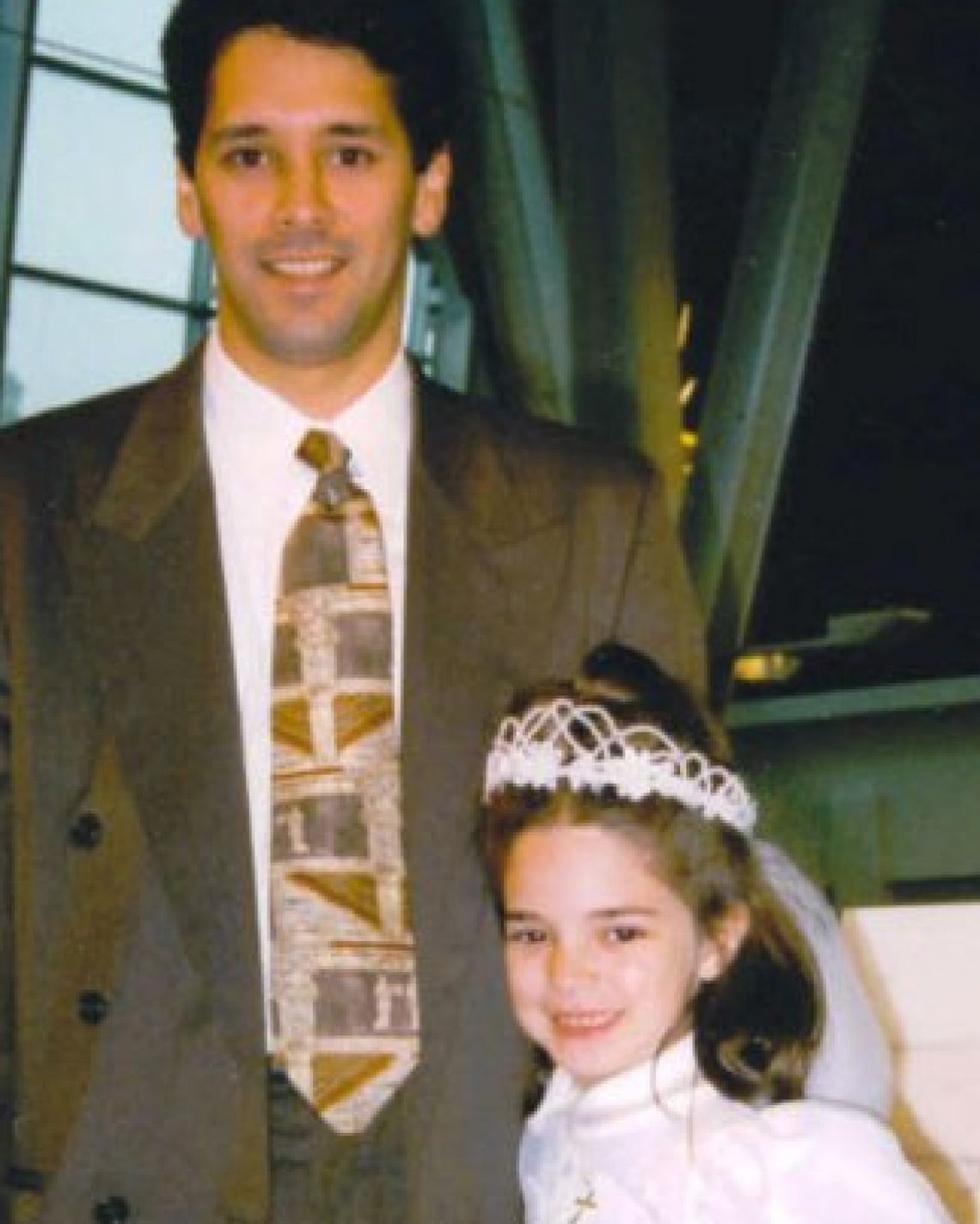
Olivia remembers walking to Anthony’s desk, pictures there of her. There was an open seating plan, low dividers between desks, a lot of friendly nerds at yellowing computers with papers everywhere, chunky calculators, the Wall Street style from the turn of the millennium in which suits hadn’t completely vanished but baggy, pleated trousers and wan, white shirts ruled the day. The sort of clothes Chandler Bing used to wear.
“Someone get this girl a T- shirt!” a worker called out.Anthony’s colleagues liked him and were fun and helpful and loved having a 10-year-old in the building. Olivia didn’t want the day to end. Alone, together with her father. AIM chatting to him was fun. Being with him in person was so much better.
“Call me to tell me what your new school is like,” he said as he dropped her off at her mother’s house that night. It was late summer, early September, the Long Island humidity still heaving and wet. Olivia was about to start sixth grade.
Ninety percent of Americans found out about September 11 on television. Olivia found out about it through whispers in her sixth-grade classroom.
Out of nowhere, kids started getting pulled from the room. It didn’t take long for the rumors to start flowing.
“Terrorists are putting sharks in people’s pools,” someone said. That’s why parents were showing up to take their children home. Each story was more insane than the last.
“Please,” one of Olivia’s classmates begged the teacher. “Why are all these kids leaving?” The teacher hesitated. She wasn’t supposed to say anything.
The next period was lunch. By then, Olivia already knew Anthony was dead.
Nobody had told her directly, but based on what her teacher had said about the World Trade Center, she just knew. It was well past commuting hours already. Anthony would have been at work bright and early. He was always very punctual, never late to anything. He would’ve been there at his desk with the pictures of her, with the computers and calculators and the colleague who said, “Get this girl a T- shirt!”
They had a funeral for Anthony. Olivia hid in the basement of the funeral parlor, curled up and crying. She didn’t know how to lose somebody like this. Adulthood hit before puberty arrived. That childhood feeling of safety amid Long Island’s samey-same houses and lawns and air-bagged SUVs evaporated. Olivia felt as if she aged decades in days. The outpourings of grief, such grand talk, continued long after the funeral, growing so trite she became inured to it.
But there was this thing Olivia kept doing. This thing CoolBlue91 kept doing. She knew it didn’t make sense. But as she grew older, as dial-up shifted to broadband, desktops to laptops, Olivia kept adding his screen name, NYAvenger, to her Buddy List.
One night, she heard that creaking-door sound. She saw NYAvenger online. She nearly threw up.
Was he back?
Was he somewhere in the world — alive — logging on to America Online? They still, after all that time, had not found his remains.
But it was just her uncle, Anthony’s brother, logging on to his AIM account, shutting it down.
Excerpted from WHAT HAPPENED TO MILLENNIALS: In Defense of a Generation by Charlie Wells. Copyright © 2025 by Charlie Wells. Published and reprinted by permission of Abrams Press, an imprint of ABRAMS. All rights reserved.
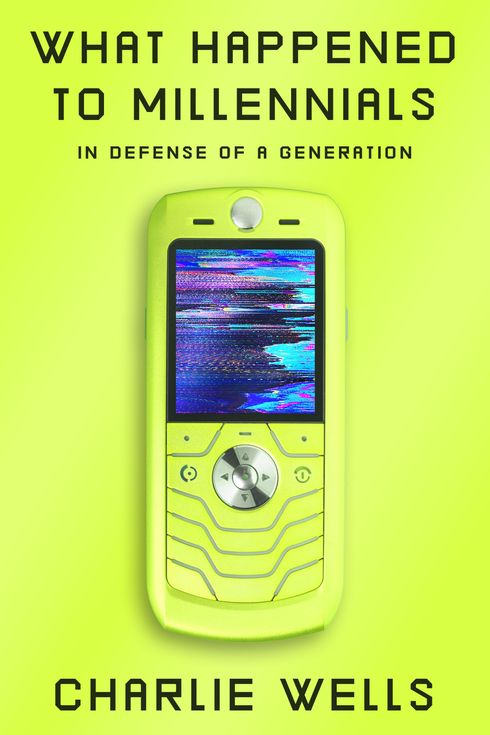
What Happened to Millennials: In Defense of a Generation by Charlie Wells
9/11 set the course of American history and politics — it also irrevocably shaped a generation.

